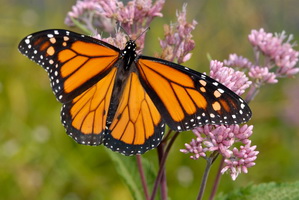
GMOs Not the Cause of Monarch Butterfly Decline, Study
February 13, 2019| |
 Monarch butterflies and their principal host plant, the milkweed, have been declining in abundance even before GM crops were planted. This was the result of an extensive study conducted by Jack Boyle, a Mellon Postdoctoral Fellow of Environmental Science and Policy at College of William & Mary. Boyle and team's study is published in the Proceedings of the National Academy of Sciences of the USA (PNAS).
Monarch butterflies and their principal host plant, the milkweed, have been declining in abundance even before GM crops were planted. This was the result of an extensive study conducted by Jack Boyle, a Mellon Postdoctoral Fellow of Environmental Science and Policy at College of William & Mary. Boyle and team's study is published in the Proceedings of the National Academy of Sciences of the USA (PNAS).
The researchers gathered the digital records from museums and herbaria throughout the North America and analyzed the relative abundance of both monarchs and milkweeds for over a century (1900-2016). They found that both monarchs and milkweeds were highly abundant in the early 20th century and the recent declines allegedly attributed to herbicide tolerant crops were actually part of a declining trend observed to begin at around 1950.
The paper concluded that herbicide resistant crops are clearly not the only culprit, and likely not even the primary culprit. Not only did monarch and milkweed declines begin decades before GM crops were introduced, but other variables, particularly a decline in the number of farms, predict common milkweed trends more strongly over the period studied.
| |
Biotech Updates is a weekly newsletter of ISAAA, a not-for-profit organization. It is distributed for free to over 22,000 subscribers worldwide to inform them about the key developments in biosciences, especially in biotechnology. Your support will help us in our mission to feed the world with knowledge. You can help by donating as little as $10.
-
See more articles:
-
News from Around the World
- A Comprehensive Review of the Environmental Safety of Bt Crops Now Published
- New Chocolate has Its Own Pro-GMO Label to Promote GMO Farming
- NASA: Tree Planting and Agri in China and India Make Earth Greener
- Experts Call for Urgent Political Support for Agri-biotech in the Philippines
- Genes that Resist White Rust Pathogen Found
- Study Finds Attitudes of the Youth toward GM Food Affected by Family Members
- Rothamsted Research Applies for New Trials of GM Camelina
- COGEM: No Risk in Import and Processing of GM Maize Bt11
-
Research Highlights
- Scientists Report First Genetic Transformation of Einkorn
- Haplotype Analysis of Rice Genes Helps Development of Tailor-made Rice with Improved Genetic Gains
- GMOs Not the Cause of Monarch Butterfly Decline, Study
-
Beyond Crop Biotech
- NRGene and Kayagene Introduce the First Fully-Phased Cannabis Genome
-
Announcements
- International Conference on Industrial Crops
-
Plant
- CRISPR-Cas9 Used for Targeted Disruption of FAD2–2 Microsomal Omega-6 Desaturase in Soybean
- Improved CRISPR System with Power on Switch for Gene Editing
-
Read the latest: - Biotech Updates (December 17, 2025)
- Gene Editing Supplement (December 17, 2025)
- Gene Drive Supplement (February 22, 2023)
-
Subscribe to BU: - Share
- Tweet
